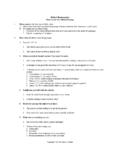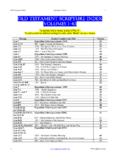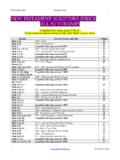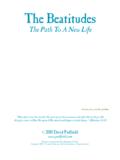Transcription of Reference Books - Balboa Software -- Library Master
1 Biblical Hermeneutics Methodology of Word Studies Part 1: Reference Books I. Introduction A. Words are the building blocks of language. B. A word study is a method of learning the meaning of words in the original languages of the Bible (Greek, Hebrew, Aramaic). 1. The goal of a word study is to determine how a word was used by the author in accordance with the normal usage of the word in the author's time and culture. 2. A word study will yield two things about a word: a. The semantic range of the word in the original language the possible meanings of the word b. The meaning of the word in the passage you are studying. C. There are 2 ways to learn the range of meanings of a word: 1. Look up the meaning of the word in Reference Books , such as Greek lexicons and word study Books .
2 2. Inductively determine the meaning by looking at the places the word is used in the Bible. II. Essential Reference Books A. Good Bible study requires high quality Reference Books that show the meaning of key words. 1. Concordances, Greek/Hebrew lexicons, word study Books , Bible dictionaries, a Bible encyclopedia 2. The least expensive way to acquire a good Reference Library is with Logos Bible Software or another good Bible program that includes Reference Books (Accordance, Bible Works). 3. Since a great deal of new insights have been gained in the last 100 years on the meaning of Greek and Hebrew words, newer Reference Books are much more likely to be accurate (since 1960). Verify the original publication date of Reference Books in Bible Software and online ( on Wikipedia).
3 B. Greek and Hebrew lexicons 1. A lexicon is a dictionary that lists words in one language and the meaning in another language. 2. It helps to have a basic a knowledge of Greek or Hebrew or at least the script. Logos Bible Software lets you look up words in Greek and Hebrew lexicons, by clicking on an English word in your Bible. 3. Information in a lexicon article on a word a. The semantic range (possible meanings). the Greek word (adelphos, brother ). from Bauer's Greek lexicon: (1) physical brother: a male born from the same parents (2) a person viewed with close affinity (has several subcategories). (a) one who shares the same beliefs (b) a compatriot (citizen of the same country). (c) a neighbor or close friend b.
4 Examples of each meaning: Bible verses and citations outside the Bible where the word is used in a particular way. c. Word roots and etymology (the derivation of the word from older words). d. Irregular forms of words ( an unusual plural or possessive form). e. Bibliography on each word: articles and other Books 4. Greek lexicons a. Bauer, Danker, Arndt, Gingrich, A Greek-English Lexicon of the New testament and Other Early Christian Literature (BDAG or Bauer): The standard authoritative Greek lexicon for the New testament period (called Hellenistic or Koine Greek). Copyright 2017 Dr. Harry Hahne Word Studies: 1. Reference Books Page 2. b. J. P. Louw and Nida, A Greek English Lexicon of the New testament Based on Semantic Domains (Louw-Nida): A useful supplement to Bauer's lexicon, but not as much in depth.
5 It groups words with a similar meaning (semantic domain) so you can see the words that share a similar meaning. Each word appears under several articles, with a separate entry for each semantic domain. c. Liddell and Scott, A Greek English Lexicon (LS or LSJ): The standard lexicon of classical Greek. It covers the full time range of ancient Greek, from 11th century BC through the Byzantine (medieval) period. Be sure that a particular meaning is appropriate in the New testament period. 5. Hebrew Lexicons a. Koehler, Baumgartner and Stamm, Hebrew & Aramaic Lexicon of the old testament (HALOT): The standard modern, authoritative lexicon for Biblical Hebrew. b. Brown, Driver and Briggs, Hebrew and English Lexicon (BDB).
6 Still widely used and trusted, despite being written in 1906. c. Holladay's Concise Hebrew and Aramaic Lexicon: Concise, yet reliable and easier to use than BDB. It is an abridgement of HALOT. It should not replace HALOT or BDB for study. d. Clines, David J. A., ed. The Dictionary of Classical Hebrew. A state of the art, authoritative Hebrew lexicon that covers from earliest Hebrew through AD 200, including non-biblical Hebrew, such as the Dead Sea Scrolls, Ben Sira, and Hebrew inscriptions. 6. Lexicons to avoid a. Strong's Greek and Hebrew Lexicon (in Strong's Concordance): This tells you the ways that the Greek and Hebrew words are translated in the KJV and includes a basic definition of words (a gloss).
7 It is out of date (19th century) and never was useful for serious word definitions. b. Thayer, Greek-English Lexicon of the New testament : This was a masterful work in its time, but out of date (late 19th century). Many word meanings are inadequate, due to the discovery of thousands of Greek writings from the New testament era. The publication and analysis of these documents around 1900 revolutionized scholars' understanding of New testament Greek. c. Liddell and Scott, An Intermediate Greek Lexicon (use with caution): This abridgment of Liddell- Scott has just the basic word definitions, with no indication of appropriate time periods or how frequently the word is used a particular way. Some meanings were not used in the New testament period.
8 7. See Fee, New testament Exegesis, 104-109 for an example of how to use Bauer's lexicon. C. Greek and Hebrew word study Books 1. Word study Books have detailed articles on the meaning of the words in the original languages. a. semantic range and nuances of meaning b. the changes in meaning different periods of history (diachronic study). c. the different uses of words by various biblical authors (synchronic study). d. the theological significance of the words in the New testament and old testament . e. Essays are comprehensive so they can be quite large (the article on agape is 35 pages in TDNT). 2. Using a word study book a. To get the most out of word study Books , a basic knowledge of Greek or Hebrew is important.
9 (1) However, one can still skim the articles and learn a lot. (2) Some Books have the words arranged by English words, rather than Greek or Hebrew words. b. Two ways to use these Books : (1) Look up key, theologically weighty words in a passage you are studying. (2) Consult the Scripture index or search with Bible Software to find articles on words in the passage you are studying. Word Studies: 1. Reference Books Page 3. 3. Word study Books must be read with an alert and critical mind to extract the useful information. a. These Books blend a study of word meanings, the history of words, and theological usage of words. Read the articles with care to separate the various types of information. b. They typically contain information about the history of the meaning of words.
10 (1) Don't use a meaning from an non-biblical time ( a classical Greek meaning). c. These are sometimes called theological dictionaries because they look at the theological significance of the usage of words. Sometimes the author's theology colors his understanding of word. d. Some of these works are subject to various errors in determining word meanings, such as the etymological fallacy and anachronisms. 4. Recommended Greek word study Books : a. Thorough: (1) Moises Silva, ed., New International Dictionary of New testament Theology. 5 vol. (NIDNTTE): The best word study book for the New testament . Moderate to conservative theologically. More reliable, up to date and easier to use than TDNT. Greek and Hebrew words are transliterated, except in the subtitles of articles.









